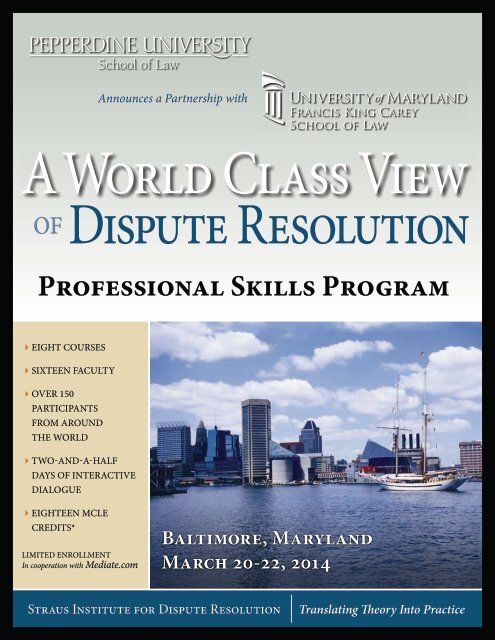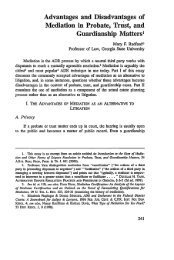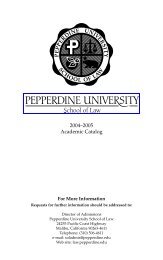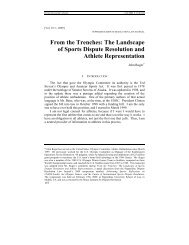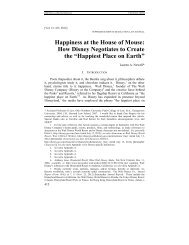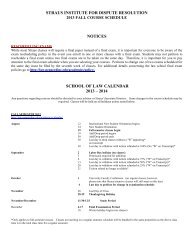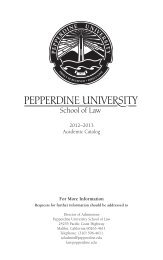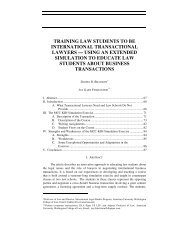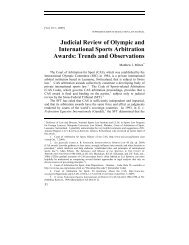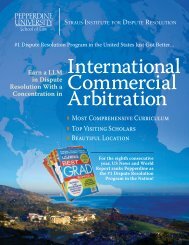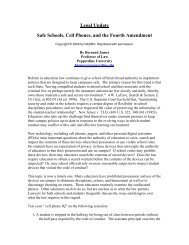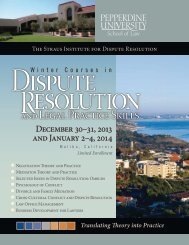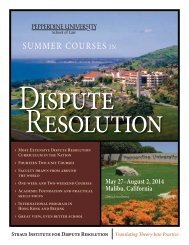Brochure - Pepperdine University School of Law
Brochure - Pepperdine University School of Law
Brochure - Pepperdine University School of Law
Create successful ePaper yourself
Turn your PDF publications into a flip-book with our unique Google optimized e-Paper software.
Announces a Partnership with<br />
A World Class View<br />
<strong>of</strong> Dispute Resolution<br />
Pr<strong>of</strong>essional Skills Program<br />
4Eight COURSES<br />
4SIXTEEN FACULTY<br />
4Over 150<br />
Participants<br />
from Around<br />
the World<br />
4Two-and-a-half<br />
Days <strong>of</strong> Interactive<br />
Dialogue<br />
4Eighteen MCLE<br />
Credits*<br />
Limited Enrollment<br />
In cooperation with Mediate.com<br />
Baltimore, Maryland<br />
March 20-22, 2014<br />
Straus Institute for Dispute Resolution<br />
Translating Theory Into Practice
March 20-22, 2014<br />
Pr<strong>of</strong>essional Skills Program<br />
in Dispute Resolution<br />
Nationally Recognized Experts<br />
Featuring a panel <strong>of</strong> nationally recognized experts in dispute resolution, this comprehensive program provides<br />
a forum for direct, informal contact with the entire program faculty. As participants from all courses eat meals<br />
together and attend plenary sessions, opportunities to share learning experiences with students involved in<br />
other dispute resolution courses are readily available.<br />
Eight Unique Educational Opportunities<br />
Participants should select the process in which they desire expertise (one course), as all eight courses will be<br />
presented simultaneously. To provide for personalized instruction, enrollment for each course is limited to<br />
ensure a close working relationship among the faculty and participants. Course sessions will include lectures,<br />
small group discussions, and practice exercises. Faculty and other participants will also provide performance<br />
coaching. The synergy <strong>of</strong> ideas will provide a truly unique learning experience.<br />
Program Schedule<br />
Baltimore, Maryland<br />
Thursday, March 20, 2014<br />
7:30 am Registration and<br />
continental breakfast<br />
8:30 am Program begins<br />
4:30 pm Evening reception<br />
Friday, March 21, 2014<br />
7:30 am Continental breakfast<br />
8:30 am Program begins<br />
5:00 pm Adjourn<br />
Saturday, March 22, 2014<br />
7:30 am Continental breakfast<br />
8:30 am Program begins<br />
1:00 pm Adjourn<br />
BALTIMORE, MARYLAND<br />
March 20-22, 2014<br />
The Pr<strong>of</strong>essional Skills Program in Dispute Resolution<br />
consists <strong>of</strong> eight three-day courses addressing distinct<br />
dispute resolution processes:<br />
Mediation Courses<br />
◗◗<br />
STAR: A Systematic Approach to Mediation Strategies<br />
(page 1)<br />
◗◗<br />
Beyond the Basics: What to Know and Do to Be a More<br />
Effective Mediator New Course! (page 2)<br />
◗◗<br />
Advanced Mediation: Skills and Techniques (page 3)<br />
Other Dispute Resolution Courses<br />
◗◗<br />
Using Practical Tools <strong>of</strong> Mindful Awareness to Improve<br />
the Work and Lives <strong>of</strong> <strong>Law</strong>yers, Mediators, Negotiators,<br />
Judges, Arbitrators, and Managers (page 4)<br />
◗◗<br />
Family <strong>Law</strong> Mediation: When Time is Not on Your Side<br />
New Course! (page 4)<br />
◗◗<br />
Strategic Negotiation Skills (page 5)<br />
◗◗<br />
Conflict Resolution Consulting: Using Mediation to Improve<br />
Organizational Communications, Team Building, Leadership,<br />
Change, and Systems Design New Course! (page 6)<br />
◗◗<br />
Conflict Management Coaching: Practice and Principles<br />
New Course! (page 7)<br />
To register or for more information, visit<br />
law.pepperdine.edu/straus<br />
or call Lori Rushford at 310.506.6342.
Mediation Workshops<br />
Star: A Systematic Approach to Mediation Strategies<br />
Mediations are dynamic and fluid. Both aspiring neutrals and<br />
sophisticated advocates should know the predictable themes and<br />
stages <strong>of</strong> mediation, as well as the variety <strong>of</strong> styles and techniques<br />
used in each stage. Competence in mediation approaches<br />
separates the serious pr<strong>of</strong>essional practitioner from the casual<br />
volunteer. This course surveys how successful mediators use a<br />
variety <strong>of</strong> approaches in five fundamental stages <strong>of</strong> a mediation.<br />
The emphasis is on encouraging the exercise <strong>of</strong> conscious<br />
pr<strong>of</strong>essional judgment and strategic analysis for both mediators<br />
and advocates.<br />
What you will learn:<br />
◗◗<br />
Stages <strong>of</strong> a mediation<br />
◗◗<br />
How to convene and open a mediation<br />
◗◗<br />
Facilitating communication<br />
◗◗<br />
Encouraging problem solving<br />
◗◗<br />
Utilizing the predictability <strong>of</strong> distributive bargaining<br />
◗◗<br />
Using intangible interests to overcome impasse<br />
◗◗<br />
Facilitating closure<br />
◗◗<br />
Balancing neutrality and fairness<br />
◗◗<br />
Managing emotions<br />
◗◗<br />
Effective case presentation<br />
◗◗<br />
Ethical concerns <strong>of</strong> mediators and advocates<br />
◗◗<br />
Mediation advocacy tips<br />
Peter Robinson is co-director <strong>of</strong> the Straus Institute for<br />
Dispute Resolution and pr<strong>of</strong>essor <strong>of</strong> law at <strong>Pepperdine</strong> <strong>University</strong><br />
<strong>School</strong> <strong>of</strong> <strong>Law</strong>. He has presented advanced negotiation and mediation<br />
skills courses in more than 39 states and foreign countries. He has<br />
served on the boards <strong>of</strong> the Christian Conciliation Service <strong>of</strong> Los<br />
Angeles, Ventura Center for Dispute Settlement, Dispute Resolution<br />
Services <strong>of</strong> the LACBA, Southern California Mediation Association, and<br />
California Dispute Resolution Council. He is a Fellow <strong>of</strong> the International<br />
Academy <strong>of</strong> Mediators, a member <strong>of</strong> the American College <strong>of</strong> Civil Trial<br />
Mediators, and was recognized as a Southern California Super <strong>Law</strong>yer in the area<br />
<strong>of</strong> mediation in 2006.<br />
Deborah Thompson Eisenberg is an associate pr<strong>of</strong>essor <strong>of</strong><br />
law and faculty director <strong>of</strong> the Center for Dispute Resolution at the<br />
<strong>University</strong> <strong>of</strong> Maryland Francis King Carey <strong>School</strong> <strong>of</strong> <strong>Law</strong>. She writes<br />
and teaches in the areas <strong>of</strong> dispute resolution, civil procedure, and<br />
employment law, and directs the Mediation Clinic. She provides<br />
pr<strong>of</strong>essional trainings in negotiation and mediation and also serves as<br />
a private mediator in employment and civil cases. Prior to academia, Eisenberg<br />
practiced civil litigation for more than fifteen years. Her diverse practice included<br />
work at a large law firm, a public interest advocacy organization, and a boutique<br />
litigation firm where she was a partner representing primarily employees.<br />
Eisenberg received her JD from Yale <strong>Law</strong> <strong>School</strong> in 1994 and graduated<br />
valedictorian <strong>of</strong> her class at the <strong>University</strong> <strong>of</strong> Maryland Baltimore County in 1991.<br />
14<br />
Peter Robinson
Mediation Workshops<br />
Beyond the Basics: What to Know and Do to Be a More Effective Mediator<br />
32<br />
Building upon the foundation <strong>of</strong> what you learned in basic<br />
mediation training, this course focuses on understanding and<br />
utilizing a wide range <strong>of</strong> additional mediator techniques and<br />
tools. Whether you mediate two or more than 20 times per year,<br />
this interactive course enhances the mediator’s existing skill set<br />
and challenges the mediator to explore new mediation experiences<br />
and enhanced learning opportunities. The course focuses on<br />
areas <strong>of</strong> practice <strong>of</strong>ten not covered or not covered in depth in<br />
most basic mediation trainings such as asymmetric mediation<br />
issues, hierarchy <strong>of</strong> asking questions, hearing what has not been<br />
said, the art <strong>of</strong> conveying <strong>of</strong>fers in mediation, and pre- and postmediation<br />
activity. Time will also be spent covering challenging<br />
ethical situations and reviewing some <strong>of</strong> the effective business<br />
practices that can benefit ADR practitioners. Through simulations<br />
and observations, participants will engage in real-time practice<br />
opportunities.<br />
What you will learn:<br />
◗◗<br />
What mediation tenets guide your mediation practice<br />
◗◗<br />
How to identify and articulate your own mediator<br />
philosophy and framework<br />
◗◗<br />
The impact <strong>of</strong> the unconscious decisions that mediators<br />
make<br />
◗◗<br />
The role <strong>of</strong> self-reflective practices<br />
◗◗<br />
Effective preparation <strong>of</strong> parties before and after mediation<br />
◗◗<br />
How to identify and address ethical situations in real time<br />
◗◗<br />
Enhanced solution-generating techniques<br />
◗◗<br />
The strategic use <strong>of</strong> effective business practices,<br />
including data management, online communication,<br />
and identifying conflicts <strong>of</strong> interest<br />
Toby Treem Guerin, is the managing director for the Center for<br />
Dispute Resolution at the <strong>University</strong> <strong>of</strong> Maryland Carey <strong>School</strong> <strong>of</strong> <strong>Law</strong><br />
and clinical instructor. Guerin has over 10 years experience mediating<br />
and facilitating in various venues including government agencies,<br />
nonpr<strong>of</strong>it organizations, schools, and court systems. She served as the<br />
first chairperson <strong>of</strong> the Mediator Excellence Council, a mediator<br />
quality-assistance initiative in Maryland and formerly directed the agricultural<br />
mediation program at the Maryland Department <strong>of</strong> Agriculture. Guerin has trained<br />
hundreds <strong>of</strong> mediators on topics from beginning to advanced mediation, elicitive<br />
feedback, mentoring, and effective communication, among others.<br />
Marvin E. Johnson, is a nationally recognized mediator,<br />
arbitrator, and trainer and is the founder and executive director <strong>of</strong> the<br />
Center for Alternative Dispute Resolution. He serves on the JAMS<br />
panel <strong>of</strong> resolution experts. Two U.S. presidents, a U.S. secretary <strong>of</strong><br />
state, a governor <strong>of</strong> Maryland, and the chief judge <strong>of</strong> the Maryland<br />
Court <strong>of</strong> Appeals have recognized Marvin Johnson’s dispute<br />
resolution expertise by appointing him to various dispute resolution panels and<br />
boards. He is a member <strong>of</strong> the American College <strong>of</strong> Civil Trial Mediators, the<br />
National Bar Association, and the CPR Institute’s National Task Force on Diversity.<br />
He is a former <strong>of</strong>ficer and current member <strong>of</strong> the ABA’s Section <strong>of</strong> Dispute<br />
Resolution, the International Academy <strong>of</strong> Mediators, and the Society <strong>of</strong><br />
Pr<strong>of</strong>essionals in Dispute Resolution/Association for Conflict Resolution.<br />
The Center for Dispute Resolution at the <strong>University</strong> <strong>of</strong><br />
Maryland Francis King Carey <strong>School</strong> <strong>of</strong> <strong>Law</strong> (C-DRUM)<br />
advances the effective resolution <strong>of</strong> conflict to empower<br />
and transform. An integral part <strong>of</strong> the law school, C-DRUM<br />
is a comprehensive dispute resolution center for policy,<br />
scholarship, and pr<strong>of</strong>essional skills development related to<br />
problem-solving in law and society.<br />
C-DRUM’s focus areas include:<br />
◗◗<br />
Public Policy Dispute Resolution<br />
◗◗<br />
Conflict Resolution in Education<br />
◗◗<br />
<strong>Law</strong>yers as Problem-Solvers<br />
◗◗<br />
ADR Research and Scholarship<br />
◗◗<br />
Direct Mediation, Facilitation,<br />
and Training Services<br />
www.cdrum.org
Advanced Mediation: Skills and Techniques<br />
Advanced mediation is a highly interactive course that moves far<br />
beyond introductory lectures and simple role-plays to draw upon<br />
the vast mediation work <strong>of</strong> the highly experienced trainers who<br />
have more than 8,000 mediations between them and the wisdom<br />
<strong>of</strong> experienced participants. Much <strong>of</strong> the course will consist <strong>of</strong><br />
comparing participants’ techniques and approaches to common<br />
problems in mediation. The course will be limited in enrollment.<br />
Participants are accepted through application. They must have<br />
completed acceptable, basic mediation training, and have<br />
significant experience as a mediator.<br />
What you will learn:<br />
◗◗<br />
Review <strong>of</strong> the STAR approach to mediation<br />
◗◗<br />
Stages in complex mediations<br />
◗◗<br />
Understanding how different techniques apply to<br />
early-, mid-stage, and late-stage negotiations<br />
◗◗<br />
Tasks and strategies in resolving difficult cases<br />
◗◗<br />
Activities <strong>of</strong> experienced mediators in moving<br />
beyond impasse<br />
◗◗<br />
Results that experienced mediators seek beyond just a<br />
settlement, including the art <strong>of</strong> the apology<br />
◗◗<br />
The best advice from colleagues in the field who have<br />
financially successful practices—including what separates<br />
the trained mediator with no cases from the one who is<br />
in demand<br />
◗◗<br />
What prominent mediation organizations tell panelists<br />
about procedures, practices, and ethical dilemmas<br />
◗◗<br />
How culture and gender impact communication<br />
and negotiation<br />
Nina Meierding a former civil attorney, has been a national<br />
leader in the field <strong>of</strong> conflict resolution, training thousands <strong>of</strong><br />
individuals in businesses, courts, school districts, governmental<br />
agencies, medical centers, corporations, and universities throughout<br />
the United States and abroad for over 25 years. She has been an<br />
adjunct pr<strong>of</strong>essor at <strong>Pepperdine</strong> <strong>University</strong> <strong>School</strong> <strong>of</strong> <strong>Law</strong> for over 15<br />
years and Southern Methodist <strong>University</strong> for over 12 years and has taught at<br />
many other universities, as well as the National Judicial College and the California<br />
Judicial College. She is a former president <strong>of</strong> the Academy <strong>of</strong> Family Mediators<br />
and served on the board <strong>of</strong> directors <strong>of</strong> the Association for Conflict Resolution<br />
and many other organizations. She was the director and senior mediator at the<br />
Mediation Center in Ventura, California, from 1985 to 2007 where she mediated<br />
over 4,000 disputes and is currently the mediation consultant for the Wisconsin<br />
Special Education Mediation System (WSEMS).<br />
Jim Craven is a lawyer, mediator, and frequent speaker in the<br />
conflict resolution field. He has been practicing law for 36 years and<br />
remains <strong>of</strong> counsel to the Spokane, Washington, law firm <strong>of</strong> Evans,<br />
Craven & Lackie which he c<strong>of</strong>ounded in 1978. He has extensive<br />
experience in the mediation <strong>of</strong> complex disputes, having served<br />
clients throughout the northwest since 1990. He serves on the<br />
construction, commercial and mediation panels <strong>of</strong> the American Arbitration<br />
Association, and is a member <strong>of</strong> the Washington Mediation Association. Craven<br />
was a trial lawyer for 25 years before becoming a full-time neutral. His trial<br />
practice emphasized complex construction, environmental, commercial, and<br />
pr<strong>of</strong>essional negligence litigation. He received his law degree from Gonzaga<br />
<strong>University</strong> and the LLM in dispute resolution from <strong>Pepperdine</strong> <strong>University</strong>. In<br />
addition to his dispute resolution practice, Craven consults with business and<br />
government on a wide range <strong>of</strong> issues.<br />
34<br />
Nina Meierding
Other Dispute Resolution Workshops<br />
Using Practical Tools <strong>of</strong> Mindful Awareness<br />
to Improve the Work and Lives <strong>of</strong> <strong>Law</strong>yers, Mediators, Negotiators, Judges, Arbitrators, and Managers<br />
34<br />
<strong>Law</strong>yers, judges, mediators, and managers aspire to provide highquality<br />
service and to derive satisfaction in the process, but <strong>of</strong>ten<br />
face barriers to fulfilling such aspirations. Stress, our fast-paced<br />
lives, conflicting demands, self-doubt and other challenges distract<br />
us from bringing our whole selves to bear upon our work and our<br />
lives, even when we are trying to do so. The added complication <strong>of</strong><br />
dealing with conflict is associated with its own distracting welter <strong>of</strong><br />
thoughts, emotions, bodily sensations, and habitual modes <strong>of</strong><br />
reacting. Mindfulness, a systematic method <strong>of</strong> paying attention,<br />
deliberately, in the moment, without judgment can help us gain<br />
awareness <strong>of</strong> our mental and emotional processes, our habitual<br />
reactions, and their manifestations in our mind, body, and breath.<br />
Such awareness opens the door to developing ourselves in ways that<br />
will enable us to perform better, to develop insights, to improve our<br />
well-being and to get more fulfillment from our work.<br />
What you will learn:<br />
◗◗<br />
The Taking STOCK © technique, developed by Wohl and<br />
Leonard L. Riskin, a practical technique to continually<br />
integrate mindfulness into our work and lives. It will be<br />
practiced in various negotiation and dispute resolution roles.<br />
◗◗<br />
Jurisight® exercises, developed by Rogers, which teach<br />
accessible and memorable ways to integrate mindfulness<br />
into our work and lives.<br />
◗◗<br />
The science <strong>of</strong> mindfulness and how mindfulness practices<br />
have been associated with changes to the structure and<br />
function <strong>of</strong> the brain.<br />
◗◗<br />
The Taking STOCK technique, which you will practice to<br />
integrate and maintain mindfulness in various negotiation<br />
and dispute resolution roles<br />
Scott Rogers is founder and director <strong>of</strong> the Miami <strong>Law</strong>’s<br />
Mindfulness in <strong>Law</strong> Program where he teaches Mindful Ethics,<br />
Mindfulness in <strong>Law</strong>, and Mindful Leadership. Rogers is creator <strong>of</strong><br />
Jurisight®, one <strong>of</strong> the first programs in the country to integrate<br />
mindfulness and the law and broke ground <strong>of</strong>fering CLE programs that<br />
introduced neuroscience research along with contemplative practices<br />
in the legal context. A nationally recognized leader in the field <strong>of</strong> mindfulness, he<br />
has shared mindfulness with thousands <strong>of</strong> legal pr<strong>of</strong>essionals including lawyers, law<br />
faculty, law students, mediators, and judges. He collaborates with cognitive<br />
neuroscientist, Amishi Jha, exploring the enduring brain changes that may<br />
accompany mindfulness training. Rogers is author <strong>of</strong> The Six-Minute Solution: A<br />
Mindfulness Primer for <strong>Law</strong>yers; Mindfulness for <strong>Law</strong> Students; and Mindful<br />
Parenting. He has spoken at law and scientific conferences, appeared on television<br />
and National Public Radio, and been interviewed in newspapers and magazines for<br />
his work on mindfulness.<br />
Rachel Wohl is the director <strong>of</strong> MACRO, Maryland’s Mediation<br />
and Conflict Resolution Office. She is a mediator and attorney who<br />
successfully designed and implemented a large-scale (700-person)<br />
collaborative process that catapulted Maryland to be among the states at<br />
the forefront <strong>of</strong> the conflict resolution field. She cochaired the ABA<br />
Dispute Resolution Section’s Task Force on Improving Mediation<br />
Quality, and is a founding member <strong>of</strong> the board <strong>of</strong> directors <strong>of</strong> Mediators Beyond<br />
Borders International. Wohl received the Association for Conflict Resolution’s Mary<br />
Parker Follett Award for innovation. She has practiced meditation for over 19 years<br />
and has taught mindfulness courses at several law schools and in Scotland.<br />
FAMILY LAW MEDIATION: When Time is Not on Your Side<br />
This highly interactive, interdisciplinary training (taught by a<br />
judge and a psychologist) is designed for judicial <strong>of</strong>ficers, private<br />
counsel, staff attorneys in courts, custody evaluators, psychologists,<br />
and others who wish to learn and improve their skills in mediating<br />
family law conflicts. Special emphasis is placed on resolving<br />
disputes when there is limited time and when there are limited<br />
resources available. After exploring an overview <strong>of</strong> core models<br />
and principles <strong>of</strong> mediation and successful techniques, participants<br />
will learn a range <strong>of</strong> specific dispute resolution strategies available<br />
through mediating. Interspersed within discussion and role-plays<br />
are presentations <strong>of</strong> critical child development research, essential<br />
perspectives on the psychology and dynamics <strong>of</strong> divorce, the ways<br />
in which high levels <strong>of</strong> conflict and emotions in family law cases<br />
present special problems, and hidden opportunities for dispute<br />
resolution, as well as other practical information.<br />
*Approved for 16 hours <strong>of</strong> continuing education units for psychologists. <strong>Pepperdine</strong><br />
<strong>University</strong> is approved by the American Psychological Association to sponsor continuing<br />
education for psychologists. <strong>Pepperdine</strong> maintains responsibility for the<br />
program and its content.<br />
*Approved for 18 hours <strong>of</strong> Specialized Credits for Certified Family <strong>Law</strong> Specialists<br />
(California)<br />
*Approved for 8 hours <strong>of</strong> Children’s Counsel Credits per CRC 5.242(d) (California)<br />
What you will learn:<br />
◗◗<br />
An overview <strong>of</strong> core mediation principles<br />
◗◗<br />
Mediating as an attorney, therapist, judicial <strong>of</strong>ficer,<br />
facilitator, or judge pro tem<br />
◗◗<br />
Managing implicit power imbalances<br />
◗◗<br />
The psychology and dynamics <strong>of</strong> high-conflict divorce<br />
◗◗<br />
Specific mediation models appropriate to your jurisdiction
Strategic Negotiation Skills<br />
Strategic Negotiation <strong>of</strong>fers a comprehensive framework for<br />
analyzing negotiations and provides practical tools for achieving<br />
better negotiation results. It begins with the premise that at every<br />
single point in the bargaining, the negotiator must choose among<br />
competitive, cooperative, and problem-solving tactics. Drawing<br />
upon both empirical research and the experiences <strong>of</strong> master<br />
negotiators, the course identifies the factors the negotiator should<br />
consider when making strategic choices in each phase <strong>of</strong><br />
negotiation—planning, initial orientation, information bargaining,<br />
narrowing <strong>of</strong> differences, and closure. The course will also address<br />
the added complexities posed by multiparty negotiation, as well as<br />
negotiation counseling and the effects <strong>of</strong> the culture, gender, and<br />
race <strong>of</strong> the participants on the bargaining process. Role-plays and<br />
critiques <strong>of</strong> video-recorded negotiations will play substantial roles in<br />
the learning process.<br />
What you will learn:<br />
◗◗<br />
How to use competitive, cooperative, and problem-solving<br />
tactics<br />
◗◗<br />
Selecting the most effective tactics in any bargaining context<br />
◗◗<br />
Differences between bargaining tactics and interpersonal style<br />
◗◗<br />
Planning for negotiation<br />
◗◗<br />
Sources and uses <strong>of</strong> power—even when there appears to be none<br />
◗◗<br />
Identifying “win-win” opportunities<br />
◗◗<br />
The importance <strong>of</strong> information bargaining<br />
◗◗<br />
Responding to extremely adversarial opponents<br />
◗◗<br />
Closing the deal<br />
◗◗<br />
The peculiar challenges <strong>of</strong> multi-party negotiation<br />
◗◗<br />
The roles <strong>of</strong> gender, race, and culture in negotiation<br />
L. Randolph Lowry is president <strong>of</strong> Lipscomb <strong>University</strong> in<br />
Nashville, Tennessee. In 1986 he founded the Straus Institute for<br />
Dispute Resolution and was a pr<strong>of</strong>essor <strong>of</strong> law at <strong>Pepperdine</strong> <strong>University</strong><br />
<strong>School</strong> <strong>of</strong> <strong>Law</strong> until assuming his current position in 2005. He also<br />
works as a conflict management consultant to one <strong>of</strong> the nation’s largest<br />
hospital companies and for five years has served as board chair for two<br />
nonpr<strong>of</strong>it health care organizations. A lawyer, active mediator, consultant, and<br />
internationally recognized educator, he is on the faculty at Vermont <strong>Law</strong> <strong>School</strong> and<br />
City <strong>University</strong> in Hong Kong.<br />
John Lowry is the assistant dean <strong>of</strong> the Lipscomb <strong>University</strong><br />
College <strong>of</strong> Business in Nashville, Tennessee, and founder <strong>of</strong> the<br />
college’s <strong>School</strong> <strong>of</strong> Executive Education. In addition, he serves as<br />
assistant pr<strong>of</strong>essor <strong>of</strong> management for Lipscomb <strong>University</strong>’s College<br />
<strong>of</strong> Business, where he teaches negotiation and dispute resolution<br />
courses. Lowry also serves as vice president for the Strategic<br />
Resolutions Group, LLC (SRG). At SRG, he provides negotiation, mediation, and<br />
conflict management training for major insurance companies, health care<br />
organizations, and legal services providers. Prior to moving to Nashville, Lowry<br />
practiced law with Strasburger & Price, LLP in Dallas, Texas. As an attorney, he<br />
represented hospitals and health care providers in pr<strong>of</strong>essional liability and<br />
commercial disputes. He has also served as a California State Assembly Fellow<br />
and worked in the law department <strong>of</strong> Tenet Healthcare Corporation.<br />
54<br />
◗◗<br />
The anatomy <strong>of</strong> custody disputes<br />
◗◗<br />
Gate-keeping, attachment, and alienation<br />
◗◗<br />
Mediating personal property, custody, and visitation issues<br />
◗◗<br />
Getting past the obstacles to stipulations<br />
◗◗<br />
Mediating cases involving domestic violence<br />
◗◗<br />
Special problems: self-represented litigants, the present<br />
economy, and parents who hardly know one another<br />
◗◗<br />
Canons, ethics, obligations, and red flags<br />
The Honorable Irwin Joseph, serves as a Superior Court<br />
Commissioner in Santa Clara County, after more than eleven years <strong>of</strong><br />
bench experience that has included family, civil, and criminal<br />
assignments. During his six years in the Family <strong>Law</strong> Department, he<br />
has heard dissolution, custody, support, paternity, and domestic<br />
violence matters. He created the Judicial Mediation Program and the<br />
Early Neutral Evaluation Program for the Santa Cruz County Family Court. He has<br />
mediated thousands <strong>of</strong> conflicts since 1995. He was a faculty member <strong>of</strong> the Center<br />
for Judicial Education and Research (CJER) and the National Council <strong>of</strong> Juvenile<br />
and Family Court Judges (NCJFCJ) and a member <strong>of</strong> the Elkins Family <strong>Law</strong> Task<br />
Force. He is a graduate <strong>of</strong> La Verne <strong>University</strong> <strong>School</strong> <strong>of</strong> <strong>Law</strong> and UCLA. He<br />
cocreated this class in 2009 for those who wish to improve mediation skills in this<br />
difficult and contentious area <strong>of</strong> the law.<br />
Donald T. Saposnek, PhD, is a practicing clinical-child<br />
psychologist and child custody mediator, and a family therapist for<br />
over 40 years, and a national and international trainer <strong>of</strong> mediation and<br />
child development. He also is author <strong>of</strong> the classic book, Mediating<br />
Child Custody Disputes: A Strategic Approach, and coauthor <strong>of</strong> Splitting<br />
America: How Politicians, Super PACS and the News Media Mirror<br />
High-Conflict Divorce. He has mediated over 5,000 custody disputes since 1977,<br />
managed the Santa Cruz County Family Court Services for 17 years, and has<br />
published extensively in the pr<strong>of</strong>essional literature on mediation, child custody and<br />
child psychology. He has been teaching on the psychology faculty at the <strong>University</strong><br />
<strong>of</strong> California, Santa Cruz since 1977, is editor <strong>of</strong> the Academy <strong>of</strong> Pr<strong>of</strong>essional Family<br />
Mediator’s The Pr<strong>of</strong>essional Family Mediator, and serves on the editorial boards <strong>of</strong><br />
numerous publishers and several international journals on conflict resolution.
Other Dispute Resolution Workshops<br />
Conflict Resolution Consulting: Using Mediation to Improve Organizational<br />
Communications, Team Building, Leadership, Change, and Systems Design<br />
36<br />
Every workplace generates chronic conflicts, yet few organizations<br />
have rethought the way they work, or used conflict resolution<br />
skills and ideas to prevent and transform the sources <strong>of</strong> chronic<br />
conflict, or examined their organizational communications and<br />
“conflict cultures” to discover how their conflicts are generated<br />
and reduce their reoccurrence.<br />
Fewer still have integrated conflict resolution and coaching,<br />
trained leaders as mediators, used conflict-resolution principles to<br />
inform their change processes, conducted “conflict audits” to<br />
reveal where these streams <strong>of</strong> conflict originate, or designed<br />
complex, multilayered, self-correcting systems to improve their<br />
capacity for conflict prevention, resolution, and transformation.<br />
This workshop will provide a framework for mediators who would<br />
like to enter the emerging field <strong>of</strong> conflict resolution consulting,<br />
and learn how to integrate mediation with organizational<br />
communication, team building, leadership development, change<br />
management, and systems design. These skills can help<br />
organizations rethink the way they work and use systems-design<br />
principles to construct more collaborative, democratic, selfmanaging<br />
organizations and institutions. The workshop will<br />
identify new skills in organizational dialogue, leadership,<br />
teamwork, and collaborative processes. It will identify theories<br />
and techniques that will help participants: shape an organizational<br />
context <strong>of</strong> values, ethics, and integrity; form living, evolving webs<br />
<strong>of</strong> association; develop ubiquitous, linking leadership; build<br />
innovative self-managing teams; implement streamlined, open,<br />
collaborative processes; create complex self-correcting systems;<br />
integrate strategically; and change the way we change.<br />
Participants will also explore: the social, economic, and political<br />
sources <strong>of</strong> chronic conflict; obstacles to individual, interpersonal,<br />
and organizational change; diverse methods for overcoming<br />
resistance to change; and ways <strong>of</strong> redesigning workplace cultures,<br />
systems, structures, processes, and relationships to encourage<br />
conflict resolution. The workshop will be based on Resolving<br />
Conflicts at Work: 10 Strategies for Everyone on the Job (third<br />
edition); The Art <strong>of</strong> Waking People Up: Cultivating Awareness and<br />
Authenticity at Work; and The End <strong>of</strong> Management and the Rise <strong>of</strong><br />
Organizational Democracy, by Kenneth Cloke and Joan<br />
Goldsmith; as well as Mediating Dangerously: The Frontiers <strong>of</strong><br />
Conflict Resolution; and Conflict Revolution: Mediating Evil, War,<br />
Injustice, and Terrorism, by Kenneth Cloke.<br />
What you will learn:<br />
◗◗<br />
Analyze the chronic, systemic sources <strong>of</strong> workplace and<br />
organizational conflicts<br />
◗◗<br />
Identify complex workplace and organizational dynamics<br />
◗◗<br />
Understand the roles and skills <strong>of</strong> conflict consultants<br />
◗◗<br />
Recognize the structures, systems, relationships, processes,<br />
and “conflict cultures” that contribute to workplace and<br />
organizational conflicts<br />
◗◗<br />
Discover how to conduct “conflict audits”<br />
◗◗<br />
Learn techniques to become more skillful in conflict<br />
coaching<br />
◗◗<br />
Design multilayered, complex, self-correcting<br />
organizational systems that improve the capacity for<br />
conflict prevention, management, and resolution<br />
◗◗<br />
Understand and develop the competencies as “conflict<br />
leaders”<br />
◗◗<br />
Improve their ability to mediate workplace and<br />
organizational conflict in public- and private-sector<br />
organizations, work teams, and family businesses<br />
◗◗<br />
Learn to redesign workplaces and organizations and<br />
identify transformational opportunities in conflict<br />
◗◗<br />
Discover how to use conflicts as opportunities for personal<br />
growth, organization learning, strategic change, emotional<br />
healing, forgiveness, and transformation<br />
Kenneth Cloke, is director <strong>of</strong> the Center for Dispute Resolution<br />
in Santa Monica, California, and a mediator, arbitrator, coach,<br />
consultant, and trainer and has mediated hundreds <strong>of</strong> workplace and<br />
organizational disputes. He is the author <strong>of</strong> Mediating Dangerously: The<br />
Frontiers <strong>of</strong> Conflict Resolution; The Crossroads <strong>of</strong> Conflict: A Journey<br />
into the Heart <strong>of</strong> Conflict; and Conflict Revolution: Mediating Evil, War,<br />
Injustice, and Terrorism. He is also coauthor with Joan Goldsmith <strong>of</strong> Thank God It’s<br />
Monday! 14 Values We Need to Humanize the Way We Work; Resolving Personal and<br />
Organizational Conflict: Stories <strong>of</strong> Transformation and Forgiveness; The End <strong>of</strong><br />
Management and the Rise <strong>of</strong> Organizational Democracy; The Art <strong>of</strong> Waking People<br />
Up: Cultivating Awareness and Authenticity at Work; and Resolving Conflicts at<br />
Work: Ten Strategies for Everyone on the Job (3rd ed.).<br />
Joan Goldsmith, has been a coach, mediator, and organizational<br />
consultant with public and corporate sector organizations specializing<br />
in leadership development, organizational change, team building,<br />
strategic planning, and conflict resolution for the past 40 years. She was<br />
a faculty member at Harvard <strong>University</strong>, founder <strong>of</strong> Cambridge College,<br />
and is currently an adjunct pr<strong>of</strong>essor in the master’s degree program in<br />
conflict resolution at Southern Methodist <strong>University</strong> in Dallas, Texas. She<br />
coauthored a best-selling book on leadership, Learning to Lead: A Workbook on<br />
Becoming a Leader (4th ed.) with Warren Bennis, and is coauthor with Kenneth<br />
Cloke <strong>of</strong> Thank God It’s Monday! 14 Values We Need to Humanize the Way We Work;<br />
Resolving Personal and Organizational Conflict: Stories <strong>of</strong> Transformation and<br />
Forgiveness; The End <strong>of</strong> Management and the Rise <strong>of</strong> Organizational Democracy; The<br />
Art <strong>of</strong> Waking People Up: Cultivating Awareness and Authenticity at Work; and<br />
Resolving Conflicts at Work: Ten Strategies for Everyone on the Job (3rd ed.).
Conflict Management Coaching: Practice and Principles<br />
Conflict-management coaching, also known as conflict coaching,<br />
is a specialized niche in the field <strong>of</strong> coaching and conflict<br />
management. It is an individualized technique that has grown<br />
exponentially in the last 15 years, becoming an additional tool for<br />
an increasing number <strong>of</strong> ADR practitioners and coaches. In this<br />
specialized process, a trained coach assists people on a one-on-one<br />
basis to reach goals that are focused on strengthening their conflict<br />
competence. Specific objectives may include effectively managing a<br />
specific dispute, being proactive as to prevent the unnecessary<br />
escalation <strong>of</strong> conflict, initiating and responding to challenging<br />
conversations, and preparing for mediation, collaborative law, and<br />
other processes. Conflict-management coaching may be applied in<br />
a wide range <strong>of</strong> personal and pr<strong>of</strong>essional contexts—whenever<br />
people seek or are referred for individual assistance to improve the<br />
way they react and interact when in conflict.<br />
What you will learn:<br />
◗◗<br />
The theory, principles, and methods specific to the<br />
CINERGY® model <strong>of</strong> conflict-management coaching<br />
◗◗<br />
Basic working knowledge and experience <strong>of</strong> this coaching<br />
model as a coach, “client,” and observer<br />
◗◗<br />
An understanding <strong>of</strong> the types <strong>of</strong> skills required to conduct<br />
this process<br />
◗◗<br />
Knowledge <strong>of</strong> the range <strong>of</strong> contexts and applications <strong>of</strong> this<br />
technique<br />
◗◗<br />
Suggested documents and information about the logistics<br />
<strong>of</strong> providing conflict-management coaching<br />
CINNIE NOBLE, is a former social worker, lawyer, and mediator.<br />
Noble has studied and practiced in the field <strong>of</strong> conflict management for<br />
over 20 years. She has undergraduate degrees in law and social work<br />
and a master <strong>of</strong> laws in alternate dispute resolution. Noble is a member<br />
<strong>of</strong> the Academy <strong>of</strong> Advanced Practitioners (Association for Conflict<br />
Resolution) and is a pr<strong>of</strong>essional certified coach (International Coach<br />
Federation). Noble is a pioneer <strong>of</strong> conflict-management coaching, also known as<br />
conflict coaching, having created the CINERGY® model in 1999. She and her<br />
associates provide this form <strong>of</strong> coaching and related training around the world. She<br />
cohosts the Conflict Management Coaching Community <strong>of</strong> Practice for the<br />
International Coach Federation and chairs the Conflict Coaching Committee for<br />
the Association for Conflict Resolution. The most recent <strong>of</strong> her published books is<br />
Conflict Management Coaching: The CINERGY Model (October 2011). She has<br />
published numerous articles on conflict-management coaching and regularly<br />
speaks internationally on this subject.<br />
Janie Neff, is certified by the International Coach Federation as a<br />
pr<strong>of</strong>essional certified coach and by the Coaches Training Institute as a<br />
certified pr<strong>of</strong>essional co-active coach. She has advanced training as an<br />
organization and relationship systems coach and is a volunteer<br />
transformative mediator for the Central Susquehanna Valley<br />
Mediation Center in Pennsylvania. Neff has extensive experiences as a<br />
business owner and entrepreneur and has been in private practice as a personal<br />
and pr<strong>of</strong>essional development coach since 2002. She is highly talented in<br />
relationship building and empowering people to achieve their goals, coaching<br />
individuals in a range <strong>of</strong> contexts, and teams within organizations. Neff is a<br />
graduate <strong>of</strong> CINERGY®’s introductory and advanced conflict management<br />
coaching workshops. She is an accredited CINERGY® trainer and in addition to<br />
conducting the introductory program, she teaches certified coaches in the<br />
Coaches Leader Through Conflict workshops.<br />
74<br />
The Straus Institute Recognized as a National<br />
Leader Ranked #1 Dispute Resolution<br />
Program for Ninth Consecutive Year!<br />
When <strong>Pepperdine</strong> <strong>University</strong> <strong>School</strong> <strong>of</strong> <strong>Law</strong> first began to establish an internationally<br />
recognized institute for dispute resolution in 1986, no one could have foreseen the indelible<br />
mark it would make in its relatively short 276-year life. The combination <strong>of</strong> vision, leadership,<br />
and tireless energy has made the Straus Institute more successful than anyone imagined as<br />
it has grown to nine full-time faculty and twelve staff members, serving more than 4,000<br />
people a year.<br />
The efforts were recognized when U.S. News & World Report began ranking dispute<br />
resolution programs at law schools sixteen years ago. For 12 years it awarded <strong>Pepperdine</strong> the<br />
Number One ranking in the country, and for all other years, placed it in the Top Three.
Locations<br />
UNIVERISTY OF MARYLAND FRANCIS KING CAREY SCHOOL OF LAW,<br />
BALTIMORE, MARYLAND<br />
The Center for Dispute<br />
Resolution at the Francis King<br />
Carey <strong>School</strong> <strong>of</strong> <strong>Law</strong> and Straus<br />
Institute for Dispute Resolution<br />
are pleased to present the East Coast<br />
Pr<strong>of</strong>essional Skills Program in Baltimore,<br />
Maryland. Located in the heart <strong>of</strong> the Mid-<br />
Atlantic, participants can enjoy all that Charm<br />
City has to <strong>of</strong>fer, from the world famous<br />
National Aquarium and Inner Harbor, to<br />
historical sites like Ft. McHenry and Edgar<br />
Allan Poe’s grave (located right at the law<br />
school), to multiple art museums. Baltimore<br />
is conveniently located less than an hour<br />
from Washington, D.C. For more information<br />
about C-DRUM, visit www.cdrum.org.<br />
38<br />
<strong>Pepperdine</strong> <strong>University</strong> in Malibu, California<br />
The Straus Institute is a part <strong>of</strong><br />
<strong>Pepperdine</strong> <strong>University</strong> <strong>School</strong> <strong>of</strong><br />
<strong>Law</strong>, which is located in Malibu, California.<br />
While the magnificent vistas provides a<br />
beautiful setting for study and contemplation,<br />
<strong>Pepperdine</strong> is only 12 miles from the energy<br />
and night life <strong>of</strong> Santa Monica and 25 miles<br />
from downtown Los Angeles.<br />
Straus <strong>of</strong>fers training in various cities and<br />
states, as well as the Malibu Campus. For<br />
upcoming training programs and conferences<br />
visit straus.pepperdine.edu
Registration 20072014 COURSES COURSES IN DISPUTE IN DISPUTE RESOLUTION RESOLUTION<br />
All registrations are accepted on a first-come, first-served basis. Registrations will be accepted as long as space permits.<br />
Name __________________________________________________________<br />
First name as you would like it to appear on name tag<br />
Organization _____________________________________________________<br />
Position _________________________________________________________<br />
Mailing address ___________________________________________________<br />
City __________________________________ State_____________ Zip ______<br />
E-mail __________________________________________________________<br />
Business phone (<br />
) ______________________________________________<br />
I Would Like to Attend the Following Course:<br />
(Please choose only one course)<br />
Baltimore<br />
❏◗ ◗ STAR: A Systematic Approach to Mediation Strategies<br />
❏◗ ◗ Beyond the Basics: What to Know and Do to Be a More Effective Mediator<br />
❏◗ ◗ Advanced Mediation: Skills and Techniques<br />
❏◗ ◗ ◗Conflict Resolution Consulting : Using Mediation to Improve<br />
Organizational Communications, Team Building, Leadership,<br />
Change, and Systems Design<br />
❏◗ ◗ ◗Using Practical Tools <strong>of</strong> Mindful Awareness to Improve the Work and Lives<br />
<strong>of</strong> <strong>Law</strong>yers, Mediators, Negotiators, Judges, Arbitrators, and Managers<br />
❏◗ ◗ Strategic Negotiation Skills<br />
❏◗ ◗ ◗Family <strong>Law</strong> Mediation: When Time is Not on Your Side<br />
❏◗◗ ◗ ◗Conflict Management Coaching: Practice and Principles<br />
Include a $1,295 or $1,195 early registration fee with this form.<br />
Governmental, nonpr<strong>of</strong>it, and MPME rate is $895.<br />
q Check here for vegetarian lunches.<br />
Special dietary needs: _________________________<br />
Checks should be payable to: <strong>Pepperdine</strong> <strong>University</strong> (Please note: if a check<br />
refund is needed, participants must submit a W-9 form to the <strong>University</strong>.)<br />
q Enclosed is my check in the amount <strong>of</strong> $___________<br />
Credit cards are the preferred method <strong>of</strong> payment.<br />
Please charge $___________ to my q VISA q MasterCard<br />
Fees<br />
The fee, including meals and materials, is $1,295.<br />
Registration received by Friday, February 14, 2014,<br />
will be given a $100 discount. Early registration<br />
discount does NOT include governmental or nonpr<strong>of</strong>it<br />
organizations. A reduced rate <strong>of</strong> $895 is available for<br />
employees <strong>of</strong> governmental, nonpr<strong>of</strong>it organizations,<br />
and members <strong>of</strong> the Maryland Program for Mediator<br />
Excellence (MPME). Should a paid participant be<br />
unable to attend, tuition, less a nonrefundable fee <strong>of</strong><br />
$200, will be refunded or a substitute may attend the<br />
program. PAYMENT IS EXPECTED AT THE TIME OF<br />
REGISTRATION EITHER BY CHECK OR CREDIT<br />
CARD (Visa or MasterCard preferred). PLEASE NOTE:<br />
There is a $50 administrative fee for transferring to another<br />
program. When canceling, we require 48 hours <strong>of</strong> notice prior to<br />
the program start date or there will be an additional $50 food<br />
service fee deducted.<br />
*MCLE<br />
These activities are approved for 18 hours <strong>of</strong> MCLE credit<br />
by the State Bar <strong>of</strong> California. <strong>Pepperdine</strong> <strong>University</strong><br />
certifies that this activity conforms to the standards for<br />
approved education activities prescribed by the rules<br />
and regulations <strong>of</strong> the State Bar <strong>of</strong> California governing<br />
MCLE. Straus programs have been accepted for MCLE<br />
credit across the nation.<br />
Tax Deduction <strong>of</strong> Fees<br />
Education expenses (enrollment fees, course materials,<br />
and travel costs) may be deductible if they improve or<br />
maintain pr<strong>of</strong>essional skills. Treas. Reg. Sec. I 162-5.<br />
Guarantee<br />
All programs <strong>of</strong> the Straus Institute for Dispute Resolution<br />
are <strong>of</strong>fered with a complete guarantee <strong>of</strong> satisfaction.<br />
If a participant completes the entire program and is dissatisfied<br />
with the course content or performance <strong>of</strong> the<br />
faculty, the tuition fee will be refunded.<br />
Upcoming Institute Programs<br />
For information on future dispute resolution skills<br />
programs or for additional information on the<br />
content, faculty, or registration for this program,<br />
call Lori Rushford at 310.506.6342 or e-mail<br />
lori.rushford@pepperdine.edu.<br />
TO REGISTER AND PAY ONLINE<br />
straus.pepperdine.edu<br />
Click on the tab “Training and Conferences”<br />
generated at BeQRious.co<br />
Card # ________________________________________________ Exp.______<br />
Name on card_____________________________________________________<br />
Signature _______________________________________ Date ____________<br />
Submit to:<br />
Straus Institute for Dispute Resolution<br />
<strong>Pepperdine</strong> <strong>University</strong> <strong>School</strong> <strong>of</strong> <strong>Law</strong><br />
24255 Pacific Coast Highway<br />
Malibu, California 90263<br />
LS1308003
Straus Institute for Dispute Resolution<br />
24255 Pacific Coast Highway<br />
Malibu, California 90263<br />
Straus Institute for Dispute Resolution<br />
Translating Theory Into Practice<br />
Academic Programs<br />
Translating theory into practice has been the mission <strong>of</strong> the<br />
Straus Institute since it was established 26 years ago.<br />
At <strong>Pepperdine</strong>, theory and scholarship are not the end, but<br />
the beginning. The end is equipping lawyers, judges, and<br />
other pr<strong>of</strong>essionals with real-world skills to resolve real-world<br />
conflicts. We <strong>of</strong>fer three academic programs:<br />
LLM in Dispute Resolution<br />
Master <strong>of</strong> Dispute Resolution<br />
Certificate in Dispute Resolution<br />
Thirty-six courses and 25 faculty from around the world<br />
translate theory into practice.<br />
Upcoming<br />
Straus Events<br />
Mediating the Litigated Case<br />
Irvine and West Los Angeles,<br />
California<br />
January 23-25 and February 6-8,<br />
2014<br />
Pr<strong>of</strong>essional Skills Program<br />
Malibu, California<br />
June 19-21, 2014<br />
Hong Kong/Beijing<br />
Study Tour<br />
Summer 2014<br />
Mediating the Litigated Case<br />
Malibu, California<br />
August 4-9, 2014<br />
For additional information on academic program content,<br />
faculty, or application, contact Sarah Gonzales at 310.506.7454<br />
or e-mail sarah.gonzales@pepperdine.edu.<br />
straus.pepperdine.edu


